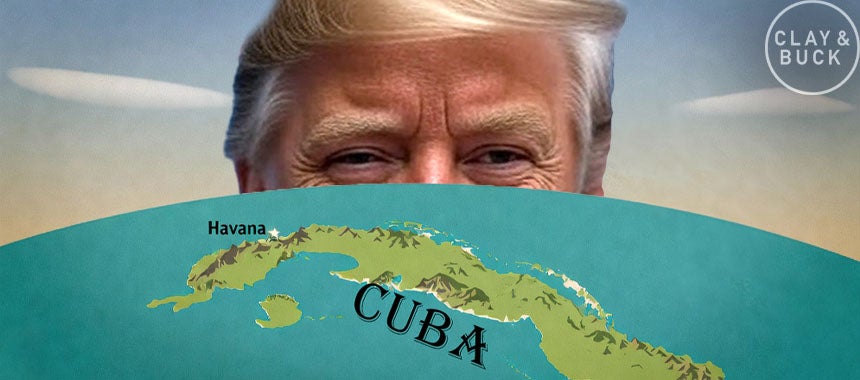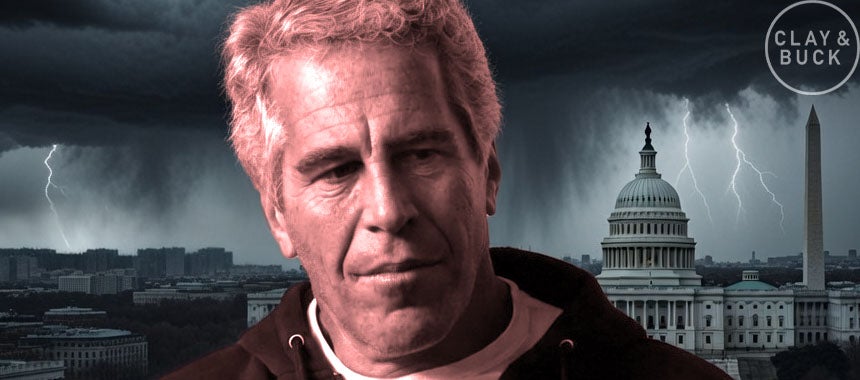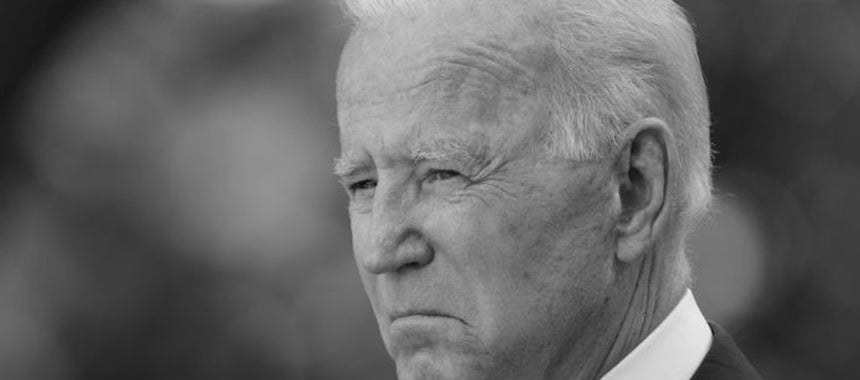Biden Loses Afghanistan, But Was There Any Winning?
9 Aug 2021
CLAY: We were forward thinking. You in particular have spent time over in the country, Afghanistan, as the United States prepares to pull out all of its last troops. And we’re not even a hundred percent out of that country yet, but already the Taliban has taken over vast segments of Afghanistan, and it really may well be a matter of time until it’s like the United States was basically never there, and once more we have created a fertile breeding ground for terrorists. Not a good option. We’re gonna have to leave at some point. We can’t be there, in theory, forever. But as soon as you leave, it’s like you were never there. Does anything that you’ve seen so far surprise you, Buck? And what happens now?
BUCK: Nothing is surprising insofar as the overall trajectory of the deterioration. Afghanistan is plunging into the chaos vortex even more rapidly than was anticipated. There was an intelligence community assessment in June that said the Taliban would likely take over the country within six months. I think that’s now a fair bet. I think you could even say that the Taliban may be on the outskirts of Kabul — essentially surrounding the final government holdouts — by October, maybe November.
So they might not even make it to the end of the year. This is the ongoing blitzkrieg that they’ve had. It’s not only rural areas. The Taliban has seized half of the country by all the best assessments that we have right now. But they’ve also seized a number of provincial capitals, places like Saripul and Taleqan and Kunduz, all in the north — and, Clay, that’s significant because we all remember what happened after 9/11 2001.
We had U.S. Special Forces and intelligence personnel, CIA and others, who deployed to Afghanistan and worked with the Northern Alliance and tremendous U.S. Air power to role up the Taliban and kick them out and, essentially, were either killed or pled into Pakistan, the Pakistani safe haven. Well, guess what? They’ve learned a lesson. Now, instead of consolidating the Pashtun… The Taliban is a Pashtun entity, a Pashtun tribe.
Instead of consolidating first in the south and east of the country, which is their traditional Taliban stronghold and homeland, they’re actually going up north into areas that had been our allies’ home bases when we started this whole thing. So they’re essentially eliminating the possibility of us having a replay of what we did before by seizing control first and foremost in the areas where they have the least amount of control.
So they’re seizing population centers. They’re already on the outskirts of Kandahar which is in the South, the second largest city in the country. They’ve had some major assassinations of government officials underway. They almost got the defense minister of Afghanistan about a week ago — complex attack with a car bomb, numerous gunmen with suicide vests on. That’s a classic tactic as well, right?
So they go in, they shoot everyone they can, and then if they get cornered or if they run out of ammo or whatever, they decide to hit the suicide vest plunger. They killed eight, wounded 20 in that. But the defense minister wasn’t home. Air strikes and Afghan special forces have been able to blunt the offensive at some level, not to stop it, but to slow it down a little bit. But here’s the huge problem we’ve got here, Clay.
We’ve moved not only U.S. military presence down dramatically. We’ve only got a few hundred troops left in the country. It’s gonna be at basically zero except for the embassy here pretty soon. But we also have thousands of contractors. Now, that might not sound as much of a critical piece, but over a thousand of those contractors were aerial maintenance personnel. The people that keep the planes and helicopters, the Blackhawks we’ve given the Afghans flying up in the sky?
If you can’t fly the plane, it’s no use to you. IF you can’t fly the helo, you’re done. What are they gonna do? The Afghans left behind are saying, “We can make basic repairs,” but Clay if they lose that close air support advantage — which they might within the next 60 days — now you’re just talking about a village-by-village, city-by-city gunfight with the Taliban, the Afghan national security forces. It’s gonna turn into a rout pretty quickly. That’s my concern.
 CLAY: That’s all really well said. And I would say this as someone who is nowhere near as sophisticated. I’m sure there’s a lot of people out there listening to us who are saying, “Okay, why should I care,” because it’s been 20 years and we’ve lost a lot of lives. And the answer would be, the reason we went into Afghanistan was to prevent groups like Al-Qaeda from being able to be organized and plan attacks inside of the country.
CLAY: That’s all really well said. And I would say this as someone who is nowhere near as sophisticated. I’m sure there’s a lot of people out there listening to us who are saying, “Okay, why should I care,” because it’s been 20 years and we’ve lost a lot of lives. And the answer would be, the reason we went into Afghanistan was to prevent groups like Al-Qaeda from being able to be organized and plan attacks inside of the country.
And so the question that I would have for you, Buck, as someone who knows Afghanistan pretty well — ’cause, again, you’ve been over there, you followed it, you worked in the CIA — is there any reason to believe that Afghanistan is not going to, in short order, become a fertile breeding ground for terrorists one more time? Maybe it takes eight, 10 years, a generation for another attack to be planned in Afghanistan and implemented in the United States or elsewhere in a western democracy, is there any reason to believe that we have created a situation where that’s less likely to occur again? Is there any reason for hope there?
BUCK: Well, there is reason for a change in our thinking, I believe, about this. Because when we went into Afghanistan and then the mission creep of nation state building and stabilization operations. That’s why we’ve been there for 20 years, right? We’ve been trying to hold this country together. Yeah, we’re not creating a Jeffersonian democracy. We all know that.
But to have some semblance of a normal member of the international community operating as the nation state, the sovereign state of Afghanistan. But we’ve also seen that there can be nests of jihadist terrorists operating within countries with some degree of safe haven and we can with strikes — particularly drone strikes, but also special operations and intelligence activities — keep them contained enough that we have not had attacks.
Look, we’ve had a number of years here where we have not had and God forbid — and dare I say this out loud, knock on wood. But we haven’t had a major mass casualty terror attack in a while now, certainly on the scale of 9/11. I know we’ve had attacks. We can talk about the Pulse nightclub, we can talk some of the vehicular mass casualty attacks. There have been terror attacks.
But a lot of those actually homegrown extremists were radicalized by online propaganda or even what we called remote-controlled plot in someone who is a foreign operative in, say, Yemen is telling an American online, “Here’s how you do it; here’s your target.” Putting that aside for a second there are terrorist safe havens right now in Yemen, in the Sinai Peninsula, in northern Nigeria, in Somalia.
You go down this list, and we’re not all constantly feeling like we’re on the edge of an imminent attack. Now, that could change in a moment and we will all know that. But the hope here, Clay, is that with Afghanistan, with the amount of pressure we can put on both from a surveillance and an aerial-asset perspective we can make sure the Taliban knows that providing safe haven, for example, to Al-Qaeda again?
And allowing external plots will result in massive retaliation the kind of which I’m not even sure we would talk about here on radio ’cause it’s so horrifying, but I think that’s where we are. I think that’s what we’re looking to do here. Because if we… By the way, if the U.S. does not decide to go back in in the next six to 12 months, I’d give the Afghan government, Ashraf Ghani and the Afghan national security forces, 10% shot they hold Kabul for more than a year.
CLAY: This is one of those awful situations where there go no good options.
BREAK TRANSCRIPT
BUCK: We want to take some calls from folks on a range of issues but Afghanistan specifically. We got Doug in Ohio who has, I will say ’cause I know what he’s gonna talk about, a brilliant point to make that I would totally, wholeheartedly agree with. Doug, go ahead. What do you got?
 CALLER: Hey, guys. I just want to say, I was in Afghanistan in 2012, and I had talked to guys that had fought the Taliban, had fought the Russians, had been there for 30 years fighting, and they said, “Until you fight Pakistan, there is nothing going on.” Until you can stop the INI from funding the Taliban, this was never gonna be a win.
CALLER: Hey, guys. I just want to say, I was in Afghanistan in 2012, and I had talked to guys that had fought the Taliban, had fought the Russians, had been there for 30 years fighting, and they said, “Until you fight Pakistan, there is nothing going on.” Until you can stop the INI from funding the Taliban, this was never gonna be a win.
BUCK: Yeah. It was completely a waste of time.
CALLER: Yeah, the Pakistani ISI, the Inter-Services Intelligence agency, has been playing a double game against us all along. We all know it. There’s no way that they were not aware that bin Laden was just down the road from what the equivalent of Pakistan’s West Point is, okay, in Abbottabad, named for a British colonel, I believe, it was back during the days when the Brits were fighting the Afghans.
BUCK: Doug, first of all, man, thank you for your service and I just also want to say thank you for bringing up the critical point, which was true when I was in Afghanistan ten years ago, that as long as the Pakistani… Think about this, Clay. You’re trying to do stability operations in a country where the idea is you put so much pressure through counterinsurgency on the bad guys — in this case, the Taliban — that they effectively crumble; they have nowhere to go.
CLAY: Yes.
BUCK: If they always can just run across the border, which they could and did, to not only a place where we can’t get them but where they’ll be trained, where they’ll be equipped, where they’ll get money, that’s what the situation was in Pakistan. It’s like we were fighting an insurgency in America against communists — if we were fighting Red Dawn style against an invasion — but the bad guys could always come over the border from Mexico or Canada, you’re never gonna win.
CLAY: Yeah. Not only that, they think in terms of hundreds of years in Afghanistan, and that’s just a fact. You heard people talk about that. I talked to a bunch of you soldiers who had been over there as well, and that’s what they came back with is, “We think in terms of years. They think in terms of decades. They think in terms of generations,” and they knew based on what had happened with Russia that sooner or later no matter how powerful the group is that is coming into their country, they’re gonna leave.
BUCK: Let’s get to one or more here. Ivan, another active duty man. Ivan in Naples, Florida. How you doing, Ivan?
CALLER: I’m good. How you doing today?
BUCK: We’re good, man. What’s on your mind?
CALLER: So I just want to say I think the way we’re pulling people out based on this administration is irresponsible, and I just say that because I did sever over there in Bagram in 2014-2015 and I believe that Bagram Airfield gonna be one of the weakest points as soon as we get out of that place.
 BUCK: We handed it over, right, Ivan? We basically left in the middle of the night, and it was already picked over by scavengers the next day.
BUCK: We handed it over, right, Ivan? We basically left in the middle of the night, and it was already picked over by scavengers the next day.
CLAY: Yes.
CALLER: Exactly. So I think ISIS is gonna get it over. I think within the next three or four months I think that’s gonna be a good stronghold for ISIS, to be honest. So that was… I say it was irresponsible to do it that way. I believe we should get out but not the way we’re getting out right now.
BUCK: Ivan, thank you for your service, and thanks for sharing your perspective on this one. Clay, I’ll tell you this… If there is a veteran out there, by the way, or active duty who wants to tell us how, short of you major U.S. military reintervention we could stop this, I would really want to know because I haven’t heard that from anybody. So I’m curious to see.
CLAY: This is why the biggest challenge is. We shouldn’t be there forever, but simultaneously as soon as we leave it’s like we’ve never been there at all. There is no win here, right? The balancing act is so difficult.
Recent Stories

Political Commentator Debra Lea Talks the Mood in Israel and the Deadline for Iran
Just back from Israel and with an eye on Iran, Debra starts by making a point: She's not in the Mossad.

President Trump Says We May Just Do a “Friendly Takeover” of Cuba
Capitalism, and President Trump, can make Cuba great again (especially if the Supreme Court rules that the communists have to give back all they stole).

We Would Never Cover Up for People Accused of Epstein’s Crimes
If you think members of the administration are covering up for heinous acts against children, you're wrong.

Manufacturing Delusion Is On Sale Now!
Buck's book opens at #4 on the New York Times bestseller list. Get your copy today!

Operation Chaos Lives in Texas! Republicans Voting Crockett?
Rush's Operation Chaos reborn in the Lone Star state!






